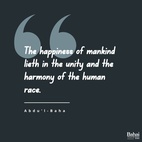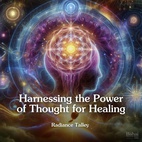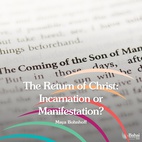The views expressed in our content reflect individual perspectives and do not represent the authoritative views of the Baha'i Faith.
Go to ’The Promise of World Peace, Part 1’.
The endowments which distinguish the human race from all other forms of life are summed up in what is known as the human spirit; the mind is its essential quality. These endowments have enabled humanity to build civilizations and to prosper materially. But such accomplishments alone have never satisfied the human spirit, whose mysterious nature inclines it towards transcendence, a reaching towards an invisible realm, towards the ultimate reality, that unknowable essence of essences called God. The religions brought to mankind by a succession of spiritual luminaries have been the primary link between humanity and that ultimate reality, and have galvanized and refined mankind’s capacity to achieve spiritual success together with social progress.
No serious attempt to set human affairs aright, to achieve world peace, can ignore religion. Man’s perception and practice of it are largely the stuff of history. An eminent historian described religion as a “faculty of human nature”. That the perversion of this faculty has contributed to much of the confusion in society and the conflicts in and between individuals can hardly be denied. But neither can any fair-minded observer discount the preponderating influence exerted by religion on the vital expressions of civilization. Furthermore, its indispensability to social order has repeatedly been demonstrated by its direct effect on laws and morality.
Writing of religion as a social force, Baha’u’llah said: “Religion is the greatest of all means for the establishment of order in the world and for the peaceful contentment of all that dwell therein.” Referring to the eclipse or corruption of religion, he wrote: “Should the lamp of religion be obscured, chaos and confusion will ensue, and the lights of fairness, of justice, of tranquillity and peace cease to shine.” In an enumeration of such consequences the Baha’i writings point out that the “perversion of human nature, the degradation of human conduct, the corruption and dissolution of human institutions, reveal themselves, under such circumstances, in their worst and most revolting aspects. Human character is debased, confidence is shaken, the nerves of discipline are relaxed, the voice of human conscience is stilled, the sense of decency and shame is obscured, conceptions of duty, of solidarity, of reciprocity and loyalty are distorted, and the very feeling of peacefulness, of joy and of hope is gradually extinguished.”
If, therefore, humanity has come to a point of paralyzing conflict it must look to itself, to its own negligence, to the siren voices to which it has listened, for the source of the misunderstandings and confusion perpetrated in the name of religion. Those who have held blindly and selfishly to their particular orthodoxies, who have imposed on their votaries erroneous and conflicting interpretations of the pronouncements of the Prophets of God, bear heavy responsibility for this confusion–a confusion compounded by the artificial barriers erected between faith and reason, science and religion. For from a fair-minded examination of the actual utterances of the Founders of the great religions, and of the social milieus in which they were obliged to carry out their missions, there is nothing to support the contentions and prejudices deranging the religious communities of mankind and therefore all human affairs.
The teaching that we should treat others as we ourselves would wish to be treated, an ethic variously repeated in all the great religions, lends force to this latter observation in two particular respects: it sums up the moral attitude, the peace-inducing aspect, extending through these religions irrespective of their place or time of origin; it also signifies an aspect of unity which is their essential virtue, a virtue mankind in its disjointed view of history has failed to appreciate.
Had humanity seen the Educators of its collective childhood in their true character, as agents of one civilizing process, it would no doubt have reaped incalculably greater benefits from the cumulative effects of their successive missions. This, alas, it failed to do.
The resurgence of fanatical religious fervour occurring in many lands cannot be regarded as more than a dying convulsion. The very nature of the violent and disruptive phenomena associated with it testifies to the spiritual bankruptcy it represents. Indeed, one of the strangest and saddest features of the current outbreak of religious fanaticism is the extent to which, in each case, it is undermining not only the spiritual values which are conducive to the unity of mankind but also those unique moral victories won by the particular religion it purports to serve.
However vital a force religion has been in the history of mankind, and however dramatic the current resurgence of militant religious fanaticism, religion and religious institutions have, for many decades, been viewed by increasing numbers of people as irrelevant to the major concerns of the modern world. In its place they have turned either to the hedonistic pursuit of material satisfactions or to the following of man-made ideologies designed to rescue society from the evident evils under which it groans. All too many of these ideologies, alas, instead of embracing the concept of the oneness of mankind and promoting the increase of concord among different peoples, have tended to deify the state, to subordinate the rest of mankind to one nation, race or class, to attempt to suppress all discussion and interchange of ideas, or to callously abandon starving millions to the operations of a market system that all too clearly is aggravating the plight of the majority of mankind, while enabling small sections to live in a condition of affluence scarcely dreamed of by our forebears.
How tragic is the record of the substitute faiths that the worldly-wise of our age have created. In the massive disillusionment of entire populations who have been taught to worship at their altars can be read history’s irreversible verdict on their value. The fruits these doctrines have produced, after decades of an increasingly unrestrained exercise of power by those who owe their ascendancy in human affairs to them, are the social and economic ills that blight every region of our world in the closing years of the twentieth century. Underlying all these outward afflictions is the spiritual damage reflected in the apathy that has gripped the mass of the peoples of all nations and by the extinction of hope in the hearts of deprived and anguished millions.
The time has come when those who preach the dogmas of materialism, whether of the east or the west, whether of capitalism or socialism, must give account of the moral stewardship they have presumed to exercise. Where is the “new world” promised by these ideologies? Where is the international peace to whose ideals they proclaim their devotion? Where are the breakthroughs into new realms of cultural achievement produced by the aggrandizement of this race, of that nation or of a particular class? Why is the vast majority of the world’s peoples sinking ever deeper into hunger and wretchedness when wealth on a scale undreamed of by the Pharaohs, the Caesars, or even the imperialist powers of the nineteenth century is at the disposal of the present arbiters of human affairs?
Most particularly, it is in the glorification of material pursuits, at once the progenitor and common feature of all such ideologies, that we find the roots which nourish the falsehood that human beings are incorrigibly selfish and aggressive. It is here that the ground must be cleared for the building of a new world fit for our descendants.
That materialistic ideals have, in the light of experience, failed to satisfy the needs of mankind calls for an honest acknowledgement that a fresh effort must now be made to find the solutions to the agonizing problems of the planet. The intolerable conditions pervading society bespeak a common failure of all, a circumstance which tends to incite rather than relieve the entrenchment on every side. Clearly, a common remedial effort is urgently required. It is primarily a matter of attitude. Will humanity continue in its waywardness, holding to outworn concepts and unworkable assumptions? Or will its leaders, regardless of ideology, step forth and, with a resolute will, consult together in a united search for appropriate solutions?
Those who care for the future of the human race may well ponder this advice. “If long-cherished ideals and time-honoured institutions, if certain social assumptions and religious formulae have ceased to promote the welfare of the generality of mankind, if they no longer minister to the needs of a continually evolving humanity, let them be swept away and relegated to the limbo of obsolescent and forgotten doctrines. Why should these, in a world subject to the immutable law of change and decay, be exempt from the deterioration that must needs overtake every human institution? For legal standards, political and economic theories are solely designed to safeguard the interests of humanity as a whole, and not humanity to be crucified for the preservation of the integrity of any particular law or doctrine.”

















Comments
Sign in or create an account
Continue with Facebookor